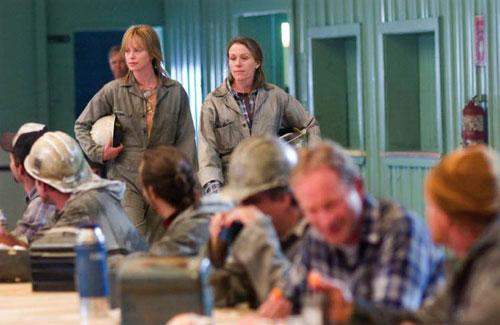
News
Summers Will Not Finish Semester of Teaching as Harvard Investigates Epstein Ties

News
Harvard College Students Report Favoring Divestment from Israel in HUA Survey

News
‘He Should Resign’: Harvard Undergrads Take Hard Line Against Summers Over Epstein Scandal

News
Harvard To Launch New Investigation Into Epstein’s Ties to Summers, Other University Affiliates

News
Harvard Students To Vote on Divestment From Israel in Inaugural HUA Election Survey
North Country

4.5 Stars
If Charlize Theron is hungry for another Oscar, her solid
performance as Josie Aimes in Niki Caro’s profound “North Country” just
might sate her appetite. But that’s not to say that the film is just a
vehicle for Theron’s advancement—she just happens to be the driver of
an extremely successful social commentary.
Three Oscar-winning leading ladies—Charlize Theron, recently
off her “Monster” Oscar win, Sissy Spacek (1980 winner for “Coal
Miner’s Daughter), and Frances McDormand (for 1996’s “Fargo”)—lead the
cast of “Country,” which is based on the true story of the first sexual
harassment class-action lawsuit.
However, “Country” is able to avoid the formulaic structure
of based-on-true-story legal dramas through its strong performances and
innovative screenwriting. As the narrative oscillates between the
protagonist’s heartbreaking personal story and an intense courtroom
battle for justice, the tension and drama engulfs the audience.
Josie Aimes (Theron) is a hard-pressed mother of two who
returns home after her failed marriage. Her mother, Alice Aimes
(Spacek), simply cannot understand why the couple couldn’t make it
work, despite Josie’s retort, “He beat me more than once and more than
lightly.”
Unable to support herself and her children on a meager
hairdresser’s salary, Josie begins working at Pearson Taconite, the
iron mine of Northern Minnesota. The work is hard, the men are
merciless—they call the female employees “cunts”—and the women are
expected “to take it like a man.”
Caro effectively and devastatingly represents the brutality of
the atmosphere: the horrible behavior becomes literally nauseating.
It’s almost impossible to believe that grown men commit intimidating
juvenility like tossing around a port-a-potty while a female worker is
inside.
To make matters worse, Josie has no support. Her female
co-workers refuse to demand change, despite the daily blow- job jokes,
name calling, and sporadic dildos in their lunch boxes. Even her best
friend Glory (McDormand), who recommended the job in the first place,
grows cold and defensive when Josie starts to rock the boat with
complaints.
Most devastating, however, are the strained familial
relationships. In such hard times, one would expect the family to be a
source of support. No help comes from Josie’s father, Hank Aimes
(Richard Jenkins), who is still angry about his daughter’s pregnancy at
16 and her unfeminine occupation, or her confused mother.
It is not a flattering picture: while Alice complacently
turns a blind eye to the Anita Hill/Clarence Thomas sexual harassment
case, she defends her daughter to the best of her capacity.
Caro succeeds in making a thoroughly complex film, so
multifaceted that this review barely covers half of the issues and
questions presented. Caro’s masterful direction is evident as every
actor reaches and breaks an emotional ceiling.
Throughout scenes of brutal rape, emotional confrontation
with her unwanted son, and strained relationships with her female
co-workers, Theron creates an indelibly affecting portrayal of a woman
struggling with oppression wherever she turns.
The somber plaintive country music with lingering lyrics,
including “Don’t want to shoot nobody, don’t want to get shot” provides
the perfect soundscape for vast overhead shots of the iron mine’s
barren snow-covered setting. The cinematography and soundtrack
crystallize to form a tangible oppression, convincing the audience why
this woman made these historic choices.
The relevance of the female struggle in a male-dominated
workplace can not be refuted, particularly when considering how much of
a stranglehold men still have over workplace conditions. The
controversy over University President Laurence H. Summers’ comments on
the innate differences between men and women brought these questions
even closer to home.
As long as sex is used as a tool to control, exploit, deny,
and dirty women, no woman or man should or could turn a blind eye to
this film. Despite how far we think we may have come, the truth is that
it can happen to you; it can be your mother, your sister, or even your
daughter, and you may have no choice but to stand up as Theron’s Josie
does.
Want to keep up with breaking news? Subscribe to our email newsletter.
